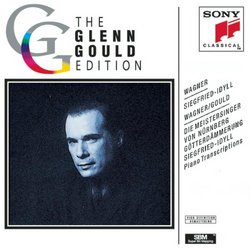| All Artists: Richard [Classical] Wagner, Glenn Gould, Toronto Symphony Orchestra Title: Wagner: Siegfried-Idyll; Gould: Transcriptions from Wagner's 'Die Meistersinger' & 'Götterdämmerung' Members Wishing: 0 Total Copies: 0 Label: Sony Release Date: 4/19/1994 Genre: Classical Styles: Opera & Classical Vocal, Forms & Genres, Symphonies, Historical Periods, Modern, 20th, & 21st Century Number of Discs: 1 SwapaCD Credits: 1 UPC: 074645265025 |
Search - Richard [Classical] Wagner, Glenn Gould, Toronto Symphony Orchestra :: Wagner: Siegfried-Idyll; Gould: Transcriptions from Wagner's 'Die Meistersinger' & 'Götterdämmerung'
CD Details |
CD ReviewsGlenn Gould's tender romantic side The Sanity Inspector | USA | 02/08/2001 (4 out of 5 stars) "In Otto Friedrich's biography of Glenn Gould, Gould is represented as saying that the _Siegfried Idyll_ has more "longeurs" in it than Wagner's notation of "ruhig bewegt" calls forth. So, in his chamber orchestra version of this lovely work Gould conducts it much slower than it is usually heard. And indeed, a certain inherent limpidness which never quite becomes maudlin comes out. Comparing this with a conventional but fine rendition by Karajan, it may well be that Gould was on to something. The _Siegfried Idyll_ sounds joyful in its normal speed, but Gould's version is full of sighs of love. The _Meistersingers_ and _Gotterdammerung_ are marvels of invention--and of editing. Gould composed new voices for his transcription, as if, he said, the pieces had been written by someone like Scriabin, who knew the piano better than Wagner did. He overtracks himself in spots, when the music calls for more fingers than he had available. The cherry on the sundae, though, is his piano transcription of the _Siegfried Idyll_. Anyone who thinks of Gould as simply the robotically precise Bach-technician and Mozart-butcherer really should hear this. Like the chamber orchestra version, he stretches this out. But, unlike his slowed-down Bach, he isn't trying to reveal some inner voice or structural detail. He is drawing out the actual, living *feeling* of this piece--just as someone like Alfred Cortot playing Chopin would. He feels the beauty of this work, and he gives it to us without a trace of irony. The dynamic range is almost too great--I found myself turning it down during the climaxes and turning it up during the coda. But this is a beautiful, beautiful accomplishment, fit to be a stylistic bookend to his famous 1955 _Goldberg Variations_. If you haven't heard it, correct that deficiency in your musical knowledge ASAP. It may not make you a Gould fan, but you'll never view him in quite the same way again." Drama and Emotion Egremont Russett | Rockledge, FL USA | 02/19/2001 (5 out of 5 stars) "If you like Glenn Gould, buy this album. If you like Wagner, buy two.The first, orchestral Siegfried, shows us another side of Glenn Gould: The Interpreter. The album is worth buying for this track alone- he manages to wring joy and agony, wonder and angst, out of a spartan score without ever pouring on the syrup.The Meistersinger track is an altogether stunning transcription, but it's in the two Gesamptkunzwerken pieces that his genius really shines through. Limited to two (and a bit) hands, he somehow manages to give us a more detailed view of each Leitmotif, bringing drama and context to each character. This Rheifahrt should be required listening for all Wagner conductors.Something I didn't notice (the first few hundred times through) was how much he manages to articulate (in the jazz sense)- he plays with the tempi, swings around it, not at all like his mechanical Bach." Gould at His Best Egremont Russett | 07/26/2000 (5 out of 5 stars) "Glenn Gould and Kevin Doyle's production of this recording is nothing short of SPECTACULAR.The quality of the performance and recording will define classical music to come"
|


 Track Listings (4) - Disc #1
Track Listings (4) - Disc #1